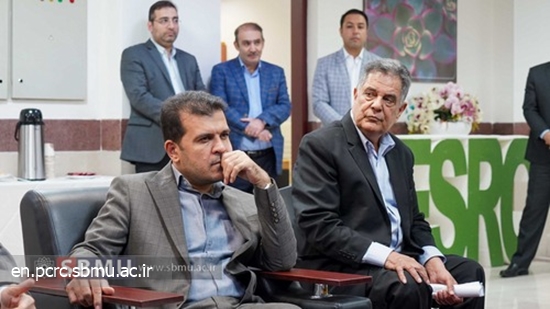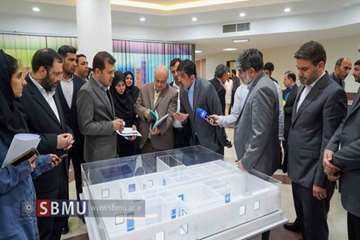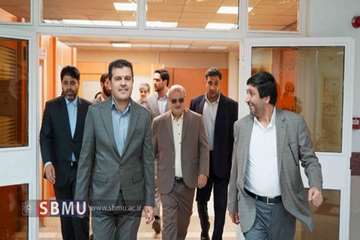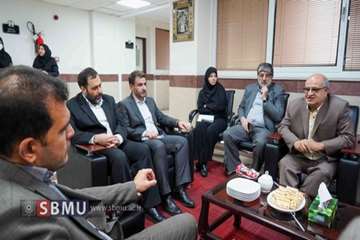The visit of the Vice President for Science and Technology
The visit of the Vice President for Science and Technology
visit


The Vice President for Science, Technology, and Knowledge-Based Economy visited the Food Health Research Center at Shahid Beheshti University of Medical Sciences today to review the implementation of the third phase of the Comprehensive Food Health Program. According to the university's public relations, Dr. Hossein Afshin emphasized the necessity of ensuring food authenticity and the importance of food security during this visit, which was attended by Dr. Alireza Zali, the university president.
He highlighted the significance of the activities of this research center, stating that the comprehensive research laboratory at the Food Health Research Center will be the first laboratory in the country to detect 490 types of toxins in food products by the end of the third phase of the Comprehensive Food Health Program and will provide a geographical identification for each product. He stressed that these investigations will provide valuable data to stakeholders in this field and importers and exporters of food products.
Dr. Afshin mentioned the localization of laboratory equipment, stating that, with the support of the Vice Presidency for Science and Technology, a laboratory device has been developed at one-seventh the cost of its foreign equivalent and is now operational. He emphasized the need to support domestic knowledge-based companies, stating that if trust is placed in these companies, there is potential for progress in many areas.
Dr. Alireza Zali, the president of Shahid Beheshti University of Medical Sciences, also stated during this visit that the Comprehensive Food Health Program is designed as a scientific initiative focusing on food quality, authenticity, and safety, reducing contaminants, detecting food pollutants, and preventing fraud in this sector. He noted that the Vice Presidency for Science and Technology, the Center for Transformation and Advancement Cooperation, the Food and Drug Organization, and the Food Health Research Center at Shahid Beheshti University are collaborating on implementing this national program. This project began in 2014, and with the completion of the second phase, the third phase will be implemented from 2024 to 2028.
The university president continued that this program is designed to empower Iranian scientists, transfer technical knowledge regarding food authenticity, create added value from food exports, enhance food quality, and reduce food fraud.
Regarding the prediction of the ability to detect 490 types of toxins by the Food Health Research Center, Dr. Zali stated that this program aims to achieve these goals through hardware and software development. It is anticipated that by the end of the third phase, there will be the capability to identify at least 490 toxins or contaminants in commonly used Iranian products. He noted that research is currently being conducted on lemon juice, saffron, meat, milk, and honey, and in the next phase, oil and other dairy products will also be included.
The university president mentioned that efforts will be made to use technologies and equipment to determine product authenticity in the shortest possible time in the laboratory. He added that if a product is found to be fraudulent, it will also be identified in which area the fraud occurred, and any unauthorized additives will be detected.
Dr. Zali pointed out that currently, 10% of food products worldwide contain impurities, and their authenticity and quality are not verified. He acknowledged that this issue may be unintentional; however, the Comprehensive Food Health Program is regarded as a national program and a mega-project in all countries.
He added that the first and second phases of this program have been completed at Shahid Beheshti University of Medical Sciences, and steps have been taken to develop and complete hardware and software, technical knowledge, and modern technologies in the next phase.
The university president stated that by the end of the second phase, they succeeded in utilizing domestic technical knowledge. Currently, 450 experts are receiving necessary training through this program with the help of technical knowledge and international collaborations with countries such as Hungary, Austria, South Korea, and the Netherlands. The third phase will involve empowering 750 expert professionals in the fields of food, food exports, and imports.
Dr. Zali added that in this development, some colleagues under knowledge-based companies have addressed many of our technical needs by localizing laboratory devices. He also concluded by emphasizing the need for increased international support, continued empowerment of experts, and the development of next-generation equipment to continue the implementation of this comprehensive plan. The goal of the third phase is to enhance technical knowledge, increase product exports, and improve food quality.
During this visit, which included Dr. Afshin Zarghi, the Vice President for Research and Technology at the university, Dr. Hassan Yazdanpanah, the head of the Research Center, and several university officials, the Food Health Research Center, comprehensive laboratories, and the Biobank of the Pharmaceutical Technology Growth Center were reviewed.


.jpg)



Comment